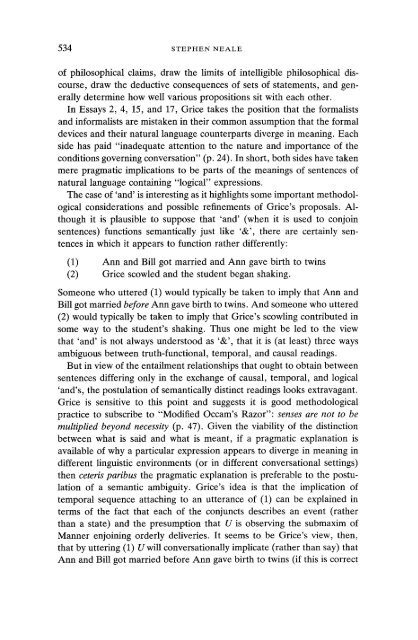Paul Grice and the philosophy of language
Paul Grice and the philosophy of language
Paul Grice and the philosophy of language
Create successful ePaper yourself
Turn your PDF publications into a flip-book with our unique Google optimized e-Paper software.
534 STEPHEN NEALE<br />
<strong>of</strong> philosophical claims, draw <strong>the</strong> limits <strong>of</strong> intelligible philosophical discourse,<br />
draw <strong>the</strong> deductive consequences <strong>of</strong> sets <strong>of</strong> statements, <strong>and</strong> generally<br />
determine how well various propositions sit with each o<strong>the</strong>r.<br />
In Essays 2, 4, 15, <strong>and</strong> 17, <strong>Grice</strong> takes <strong>the</strong> position that <strong>the</strong> formalists<br />
<strong>and</strong> informalists are mistaken in <strong>the</strong>ir common assumption that <strong>the</strong> formal<br />
devices <strong>and</strong> <strong>the</strong>ir natural <strong>language</strong> counterparts diverge in meaning. Each<br />
side has paid "inadequate attention to <strong>the</strong> nature <strong>and</strong> importance <strong>of</strong> <strong>the</strong><br />
conditions governing conversation" (p. 24). In short, both sides have taken<br />
mere pragmatic implications to be parts <strong>of</strong> <strong>the</strong> meanings <strong>of</strong> sentences <strong>of</strong><br />
natural <strong>language</strong> containing "logical" expressions.<br />
The case <strong>of</strong> '<strong>and</strong>' is interesting as it highlights some important methodological<br />
considerations <strong>and</strong> possible refinements <strong>of</strong> <strong>Grice</strong>'s proposals. Although<br />
it is plausible to suppose that '<strong>and</strong>' (when it is used to conjoin<br />
sentences) functions semantically just like '&', <strong>the</strong>re are certainly sentences<br />
in which it appears to function ra<strong>the</strong>r differently:<br />
(1) Ann <strong>and</strong> Bill got married <strong>and</strong> Ann gave birth to twins<br />
(2) <strong>Grice</strong> scowled <strong>and</strong> <strong>the</strong> student began shaking.<br />
Someone who uttered (1) would typically be taken to imply that Ann <strong>and</strong><br />
Bill got married before Ann gave birth to twins. And someone who uttered<br />
(2) would typically be taken to imply that <strong>Grice</strong>'s scowling contributed in<br />
some way to <strong>the</strong> student's shaking. Thus one might be led to <strong>the</strong> view<br />
that '<strong>and</strong>' is not always understood as '&', that it is (at least) three ways<br />
ambiguous between truth-functional, temporal, <strong>and</strong> causal readings.<br />
But in view <strong>of</strong> <strong>the</strong> entailment relationships that ought to obtain between<br />
sentences differing only in <strong>the</strong> exchange <strong>of</strong> causal, temporal, <strong>and</strong> logical<br />
'<strong>and</strong>'s, <strong>the</strong> postulation <strong>of</strong> semantically distinct readings looks extravagant.<br />
<strong>Grice</strong> is sensitive to this point <strong>and</strong> suggests it is good methodological<br />
practice to subscribe to "Modified Occam's Razor": senses are not to be<br />
multiplied beyond necessity (p. 47). Given <strong>the</strong> viability <strong>of</strong> <strong>the</strong> distinction<br />
between what is said <strong>and</strong> what is meant, if a pragmatic explanation is<br />
available <strong>of</strong> why a particular expression appears to diverge in meaning in<br />
different linguistic environments (or in different conversational settings)<br />
<strong>the</strong>n ceteris paribus <strong>the</strong> pragmatic explanation is preferable to <strong>the</strong> postulation<br />
<strong>of</strong> a semantic ambiguity. <strong>Grice</strong>'s idea is that <strong>the</strong> implication <strong>of</strong><br />
temporal sequence attaching to an utterance <strong>of</strong> (1) can be explained in<br />
terms <strong>of</strong> <strong>the</strong> fact that each <strong>of</strong> <strong>the</strong> conjuncts describes an event (ra<strong>the</strong>r<br />
than a state) <strong>and</strong> <strong>the</strong> presumption that U is observing <strong>the</strong> submaxim <strong>of</strong><br />
Manner enjoining orderly deliveries. It seems to be <strong>Grice</strong>'s view, <strong>the</strong>n,<br />
that by uttering (1) U will conversationally implicate (ra<strong>the</strong>r than say) that<br />
Ann <strong>and</strong> Bill got married before Ann gave birth to twins (if this is correct














